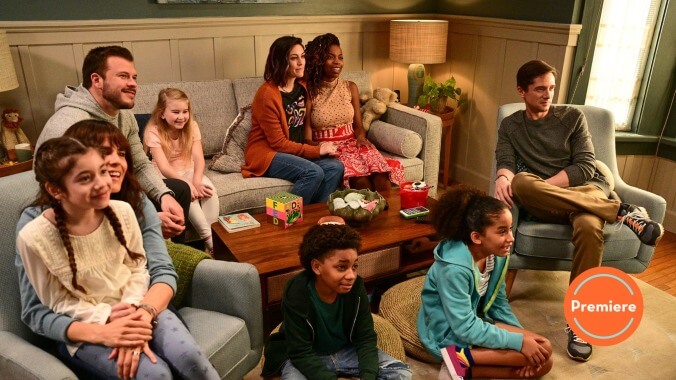Home Economics sticks to familiar feel-good sitcom territory

The first episode of ABC sitcom Home Economics is barely an expansion of its two-and-a-half-minute trailer, which focuses on the bond between the three Hayworth siblings despite each belonging to a different financial strata. Co-created by Michael Colton and John Aboud, the show is clearly trying to build on the network’s well-established brand of pleasant family comedies. The basic premise is quickly set up (in a voiceover, no less): Tom is a struggling middle-class author, Sarah is broke after losing her job as a counselor for at-risk students, and Connor is a filthy rich finance guy who just bought Matt Damon’s extravagant house. Home Economics centers on how they overcome this wealth disparity and remain close. The sitcom doesn’t offer much depth or nuance beyond its ethos of family over money, at least not early on—instead trying to shine a light on a well-picked cast and their chemistry.
Topher Grace, who is also an executive producer, returns to the small screen as Tom Hayworth, also the narrator of the series. Tom secretly uses his extended family adventures as the basis for a new book after the previous one—which was about a prison baseball team in 1906, and had no women in it—sold five copies. The cast, which also includes Caitlin McGee, Jimmy Tatro, Karla Souza, and Sasheer Zamata, is a strong one. There’s an easygoing vibe in all of their interactions, but the writing and storytelling offers them rudimentary characterization. The heartwarming humor tries to fill in the gap left by Modern Family, which ended in 2020 after 11 seasons, but doesn’t offer anything new to the genre just yet.
The episode kicks off as Connor moves back to San Francisco from Seattle and invites his family to his newly purchased lavish mansion. Both Tom and Sarah are figuring out how to ask their younger, richer brother for a loan, getting encouragement from their spouses to do so. After exploring the many rooms in his new house, they all get into a fight when Connor reveals he is taking their parents to Turks and Caicos for Thanksgiving instead of doing their usual big affair. This unravels all of their personal problems as Tom and Sarah reveal they need financial help, and Connor admits he is getting a divorce and moved back so that he can be around loved ones again. The siblings make up and then revel in the fact that they’re all going through various problems together, not just by themselves, and the whole family zips down the road in Connor’s mini-cars in a neatly tied-up ending.
If Home Economics succeeds, it’s because of the notable cast. McGee and Grace do a good job, but it’s Tatro who stands out, following up his believable performance as a high schooler in 2017's American Vandal with the markedly different role of a rich single dad. The show aims for a more contemporary take on blended families as seen on ABC, from The Brady Bunch, Full House, and My Wife And Kids to more recent comedies like Fresh Off The Boat, The Middle, and Modern Family. It features a queer couple in Sarah (McGee) and Denise (Zamata), and seemingly wants to look at how income inequality leads to actual hardships for them as well as Tom and his wife Marina (Souza). They even squeeze in a weird moment when Tom, recording notes for his book, discusses this inequality just as he bumps into Connor’s housekeeper, Lupe (Lidia Porto), who overhears and gives him a questionable look. It’s a sitcom on ABC, so the scene is glossed over and played for laughs as the episode wrap up a 20-minute run.
In its pilot, Home Economics focuses more on introducing interpersonal dynamics (like how the siblings’ favorite song is “MMMBop,” or how Denise and Sarah refer to each other lovingly as Lulu) rather than examining the severity of their money problems. While the episode does convey what the central premise is, it also mainly uses POC characters to prop up their white partners; they don’t get any other personality traits, which is especially rough because Zamata and Souza are terrific performers. The members of the primary trio are placed in defining molds: Tom is a rule-follower, Sarah is a vegan feminist, and Connor is the carefree cool dude. These opposing types make for fun exchanges, but they could also constrict character growth and performances as the show continues. The first episode ends with everyone asking Tom what his upcoming novel is about—he doesn’t tell them, but explains in a voiceover that it’s essentially about how close he feels with his family. We do get a sense of that closeness, but while there is strength in the chemistry and in the specificity of some jokes, the idea is still a bit too generic overall to generate much anticipation.
Stray observations
- The show is trying to construct a very specific image of Matt Damon in our heads by claiming his house could include a Japanese soaking tub, an indoor backyard, and enough closets that Connor could turn one into a house for his daughter’s pajamas.
- On that same note, do we agree with Sarah when she says the actor hasn’t made a good film after 2011’s We Bought A Zoo? The Martian and his cameo in Thor: Ragnarok would like a word.
- To describe Tom and Connor, Denise says “I know your brothers are Scorpios, but they’re also good people.” As a Scorpio, yeah, that remark sounds about right.
- Souza’s Marina is a former lawyer who casually jokes that Connor killed his wife. It’s a great subtle callback to her previous ABC role in How To Get Away With Murder, which also featured Jack Falahee as her law school classmate Connor Walsh.
- We’ll be checking in on the Hayworth siblings throughout Home Economics season one, so stay tuned.